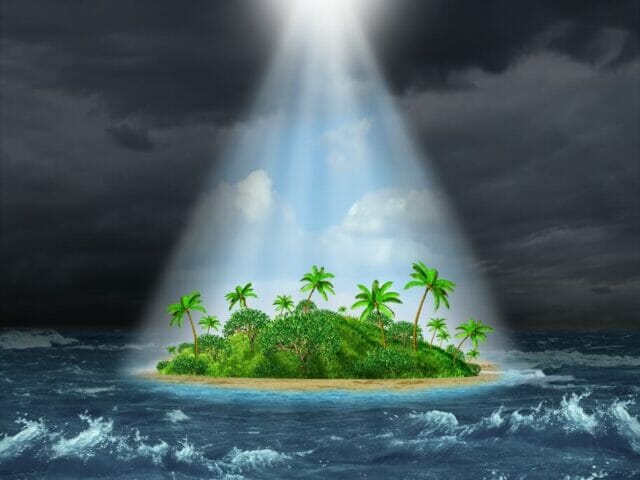Utopian fiction is a diverse and fascinating genre. It’s an ideal form of literature for these trying times.
In this guide we will:
- Clarify what utopian fiction is
- Discuss the difference between utopian and dystopian fiction
- Explore the different types of utopian fiction that are available
- Discover some examples of published utopian fiction
- Consider how you might set about writing utopian fiction
So let’s begin by considering the genre itself. How is it defined?
What Is Utopian Fiction?
A utopia is an imagined, perfect world, often set in the distant future. In utopian fiction, the author has created a setting which is seen as fair, idealistic and harmonious. Its society will be striving for perfection and will seem to have no obvious flaws.
Utopian science fiction often explores the question – ‘are perfect societies even possible?’. However, this question is an interesting one in itself – as many utopian fictions will often expose the flaws involved with a ‘perfect’ and ‘fair’ world. Is there something that is sacrificed in the pursuit for perfection and complete equality?
Utopian and dystopian fiction have characteristics of both science fiction and fantasy, but the emphasis is often placed on the emotions and perceptions of the characters living in these conditions.
Sir Thomas More
Sir Thomas More was a lawyer, judge and social philosopher and is seen as the first writer of the genre. He even invented the word ‘utopia’ from Greek roots when writing his first book of the same name in 1516. Interestingly, utopia in Greek can either mean ‘no place’ or ‘good place’ depending on the roots used. More’s Utopia imagines a perfect state and utopian society on an imagined island that has been cut off from Europe for over 1,200 years.
To fully understand utopian fiction, we also need to understand how it compares with its sister genre – dystopian fiction.
What Is The Difference Between Utopian Fiction And Dystopian Fiction?
Dystopian and utopian fiction can often be confused, and the lines between them can be blurred. In this section we will explore the main differences between utopian and dystopian Fiction.
In utopian fiction, we are imagining society that is true perfection. However, in dystopian fiction we are exploring a world where society has gone wrong. It is the direct opposite of utopian and is often chaotic, challenging, unfair and disruptive. The problems that might be affecting our world today (for example war or disease) are often more extreme in dystopian fiction and its depiction of an often anarchist society.
It is interesting that in many utopian worlds or settings it will start as a perceived perfect and well managed world but will soon turn in a destructive and harmful dystopian world once the individuals in the setting find flaws in the utopia. A perfect example of this is found in Brave New World by Aldous Huxley, where the State has total control of a supposed perfect state. Another example is George Orwell’s 1984.
Simply put, one explores an ideal society (utopian), the other an anarchist society that lacks justice and fairness (dystopian).
So now that we’ve considered the difference between utopian and dystopian fiction, let’s explore the different types of utopian literature available.

Types Of Utopian Fiction
The different types of utopian fiction include:
Ecological
In these types, society is working in harmony with nature to avoid producing waste and pollution, and nature is prioritised.
Economic
These types of work were popular after the 18th century and explore the concepts of Marx and Engels to explore self-sustaining utopian economies that benefit everyone.
Technological
In these types of modern utopia, technology meets all human needs and functions, to improve their quality of living.
Religious/Spiritual
In these societies, people are living in religious harmony without conflict or warfare.
Scientific
Similar to technology, in these settings science has helped to improve living standards, cure illnesses, and perhaps even help human beings avoid death.
Examples Of Utopian Fiction
Here are some examples of utopian fiction across the centuries. They are all considered excellent utopian works and will help to provide a fuller understanding of the subject.
As discussed before, some of these examples – for example Brave New World – are utopian novels that become dystopian, but these genres often blur.
- Utopia– Sir Thomas More (1516)
- New Atlantis– Francis Bacon (1626)
- The Blazing World – Lady Margaret Lucas Cavendish (1666)
- Gulliver’s Travels– Jonathan Swift (1726)
- Erewhon– Samuel Butler (1872)
- Gloriana – Lady Florence Dixie (1890)
- News from Nowhere – William Morris (1890)
- Looking Backwards – Edward Bellamy (1888)
- Mizora: World of Women – Mary E Bradley Lane (1991)
- Woman on the Edge of Time– Marge Piercy (1976)
- The Culture– Iain M Blanks (1987 – 2012)
- The Dispossessed – Ursula K Le Guin (1974)
- The Ones who Walk Away – Ursula K Le Guin (1973)
- Star Trek – The Original Series (1966)
- Herland – Charlotte Perkins Gilman (1915)
- Brave New World– Aldous Huxley (1931)
- When it Changed – Joanna Russ (1972)
- Afterland – Lauren Beuke (2020)
- The End of Men – Christina Sweeney-Baird (2021)
Now we have shared some utopian examples to explore, let’s consider how you might start to write a utopian novel yourself.

How To Write Utopian Fiction
In this section we will explore some key tips and considerations to make when writing utopian fiction.
Explore Theme & Issues
Consider the theme that you want to explore in your utopian fiction. Is there an issue happening in society today that you can explore further in your fiction? Maybe your book will join the group of increasingly popular feminist utopias.
Which type of utopian fiction is it likely to fall under? Scientific? Political? Environmental? Or a combination? What could provide an ‘ideal solution’ to the problem you have considered, and how will your society feel harmonised?
Build Your Utopia
Once you have understood what themes you will explore in your utopian fiction, it’s important to understand the setting and the people that will sit within it.
Do you need to draw a map of your utopia? Is there a manifesto or guiding set of rules for your people to follow? Are there any compromises to consider?
Have fun creating and playing with your world and thinking about the types of characters that sit within it, and the sacrifices they might have made.
Read!
The best way to understand the utopian genre is to read books on the genre. This will fuel your imagination and get those creative juices flowing. So there are no excuses, pick up that book!
Frequently Asked Questions
What Is Utopian Fiction In Literature?
Utopian fiction in literature explores an imagined or perfect world, something that we aspire to, or dream of. In these settings society is seen as fair and just, and people are living in harmony and without fear. Utopian fiction often poses the question, ‘is a perfect society or world possible?’.
What Is An Example Of Utopian Fiction?
One example of utopian fiction is the first utopian work, Sir Thomas More’s Utopia, in which he imagines a perfect island state.
What Is The Difference Between Dystopian And Utopian Fiction?
In utopian fiction we are imagining a society living in harmony. However, in dystopian fiction we are exploring a world where society has gone wrong. It’s the direct opposite of utopian and is often chaotic, challenging, unfair and disruptive.
Writing Utopian Fiction
I hope that this article has helped with your understanding and knowledge of the vast and interesting genre of utopian fiction. It is extremely beneficial to read and understand this genre, as it poses so many thought-provoking philosophical questions – such as ‘what is a perfect society?’ and ‘can it be truly possible to live in complete harmony?’. Utopian fiction can also help to explore human flaws and weaknesses in a perfect setting.
Utopian fiction is great genre to read and write as it crosses into so many other areas and often blurs into many great works of dystopia.
It may seem like a difficult genre to write, but it is such an inspiring one – as it often produces work that makes the reader consider deeper questions.
So, if you feel inspired by this, there is no excuse. Pick up that pen and begin to create that new utopian world!
Jericho Writers is a global membership group for writers, providing everything you need to get published. Keep up with our news, membership offers, and updates by signing up to our newsletter. For more writing articles, take a look at our blog page.










